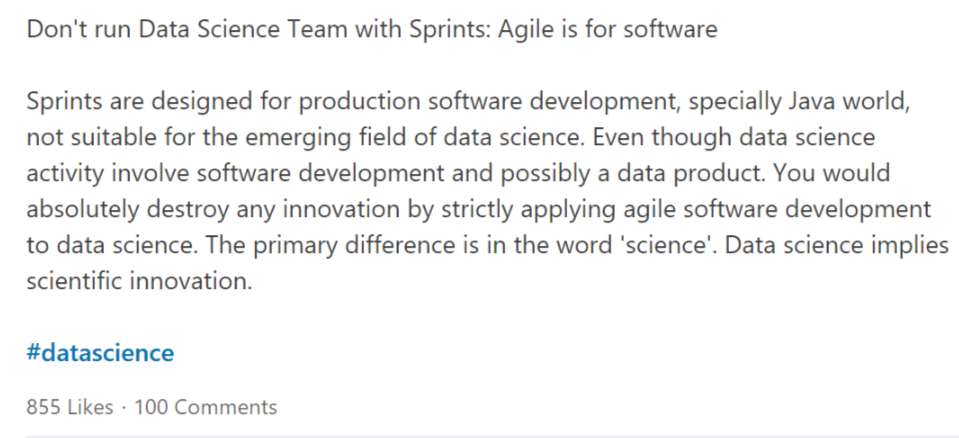When I was looking at the level three maths modules for my Open University degree, one of the ones that really drew my eye was SM358, the quantum world. I decided to only do a single module this year as I’d committed to a lot of speaking engagements in October and, in addition to my day job, I’ve been spending time on another project that I’m really excited about for the start of 2019. From past experience, if you fall behind on OU modules at the beginning, it can be very hard to catch up. This was really noticeable with the complex analysis and stochastic dynamics modules I started in 2017. Rather than taking on too much, I decided on just one level 3 module. Given my progress so far I’m only about a week behind and I’m pretty happy with that. Continue reading SM358 The Quantum World 25% in…
Agile Data Science: your data point is probably an outlier
It’s not often that I feel the need to write a reactionary post as mainly the things that tend to inflame me are usually by design. However today I read something on LinkedIn that caused a polarisation in debate within a group of people who should really appreciate learning from different data: Data Scientists.
What was interesting was how the responses fell neatly into one of two camps: the first praising the poster for speaking out and saying this, supported by nearly an order of magnitude more likes than the total number of comments, and the second disagreeing and pointing out that it can work. What has been lost in this was that “can” is not synonymous with “always” – it really needs a good team and better explanation than many companies sometimes use. What irked me most about the whole thread was the accusation that people doing data science with agile obviously “didn’t understand what science was”. I hate these sweeping generalisations and I really do expect a higher standard of debate from anyone with either “data” or “science” anywhere near their profile. Continue reading Agile Data Science: your data point is probably an outlier
ReWork Deep Learning London September 2018 part 3
This is part 3 of my summary of ReWork Deep Learning London September 2018. Part 1 can be found here, and part 2 here.
Day 2 of rework started with some fast start up pitches. Due to a meeting at the office I missed all of these and only arrived at the first coffee break. So if you want to check out what 3D Industries, Selerio, DeepZen, Peculium and PipelineAI are doing check their websites. Continue reading ReWork Deep Learning London September 2018 part 3
ReWork Deep Learning London September 2018 part 2
This is part 2 of my summary of the Rework Deep Learning Summit that took place in London in September 2018, and covers the afternoon of day 1. Part one, which looks at the morning sessions can be found here. Continue reading ReWork Deep Learning London September 2018 part 2
ReWork Deep Learning London September 2018 part 1

September is always a busy month in London for AI, but one of the events I always prioritise is ReWork – they manage to pack a lot into two days and I always come away inspired. I was live-tweeting the event, but also made quite a few notes, which I’ve made a bit more verbose below. This is part one of at least three parts and I’ll add links between the posts as I finish them. Continue reading ReWork Deep Learning London September 2018 part 1
ImageNet in 4 Minutes? What the paper really shows us
ImageNet has been a deep learning benchmark data set since it was created. It was the competition that showed that DL networks could outperform non-ML techniques and it’s been used by academics as a standard for testing new image classification systems. A few days ago an exciting paper was published on arxiv for training ImageNet in four minutes. Not weeks, days or hours but minutes. This is on the surface a great leap forward but it’s important to dig beneath the surface. The Register sub headline says all you need to know:
This is your four-minute warning: Boffins train ImageNet-based AI classifier in just 240s https://t.co/j6Wu1yMMkM
— The Register (@TheRegister) August 1, 2018
So if you don’t have a relaxed view on accuracy or thousands of GPUs lying around, what’s the point? Is there anything that can be taken from this paper?
Continue reading ImageNet in 4 Minutes? What the paper really shows us
Thinking machines – biological and artificial

If you’ve read pretty much any other of my artificial intelligence blog posts on here then you’ll know how annoyed I am when the slightest advance in the achievements of AI spurs an onslaught of articles about “thinking machines”, that can reason and opens up the question of robots taking jobs and eventually destroying us all in some not-to-be-mentioned1 film franchise style. Before I get onto discussing if and when we’ll get to a Detroit Become Human scenario, I’d like to cover where we are and the biggest problem in all this. Continue reading Thinking machines – biological and artificial
Presentations and speaking at conferences

One of the things I’ve been doing more this year is speaking more at conferences and meetups. I always take the time to speak to the audience afterwards to see if there were aspects they didn’t get or enjoy, so I can hone the presentation for the next time1. Even when under embargo of product details, there’s usually lots of things that you can talk about that the wider community will find interesting and I have been encouraging people to break their presentation fear by talking at meetups.
Following on from my “Being a Panellist” post, I’ve been asked a lot how I go about writing a presentation and what I do to prepare, so I’ve gathered my thoughts here. This isn’t the only way, but it is what works for me! Continue reading Presentations and speaking at conferences
Cognitive Bias and Review of Bandwidth by Eliot Peper

One of the things I love about Kindle unlimited is that I’m regularly finding new authors that I wouldn’t necessarily know about otherwise. At my reading rate I often find that I’m trying to pick a new book at odd hours of the day (or night) and will go with something new recommended by Amazon and this is how I came across Bandwidth by Eliot Peper.
Kindle had this prominently as a Sci-Fi choice for me while I was in the middle of several different dragon-related fantasy series and I was very much motivated for something a little more thought provoking.
And this is. Continue reading Cognitive Bias and Review of Bandwidth by Eliot Peper
Dammit I’m a Dr not a Stereotype

I’m proud to call myself Dr Bastiman. It’s on my email signature (personal and professional), it’s in my twitter name, it’s the title I use when dealing with I have to give my details for just about anything. I’m proud of it and have never consider this to be immodest. My title shows to the world that I’ve achieved something considerable. I was both surprised and then immediately not surprised when a storm started on Twitter…
My title is Dr Fern Riddell, not Ms or Miss Riddell. I have it because I am an expert, and my life and career consist of being that expert in as many different ways as possible. I worked hard to earned my authority, and I will not give it up to anyone.
— Dr Fern Riddell (@FernRiddell) June 13, 2018
I’ve had similar rants myself over the years. Particularly at one company where using my title in my email signature didn’t fit their cultural “tone of voice” yet at the same time senior males with PhDs were allowed to use their titles… I now use mine everywhere. However, the reason that the tweet came to my attention was one of the bizarre responses… Continue reading Dammit I’m a Dr not a Stereotype